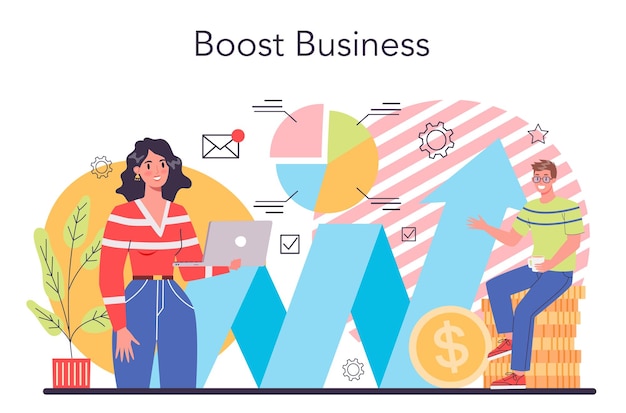Discovering Your Ideal Business Concept: A Comprehensive Guide for Future Business Owners
The prospect of owning your own business is a thrilling vision that many people share. However, not everyone has the drive to act on it… but if you’re prepared to take the plunge, you’ll need a concept to start with.
The dilemma that troubles most budding entrepreneurs? How do I uncover the ideal business concept?
The reality is, there isn’t a single “perfect” concept waiting to be found. But there are effective tactics to discover a concept with high potential, one that aligns with your interests, abilities, and the market. This blog post will be your comprehensive guide into the realm of concept generation, taking you beyond the typical brainstorming techniques and into the core of what truly makes a business concept successful.

Nontraditional Idea Inspiration: Venturing Beyond the Brainstorming Box
Discard the mind map on a whiteboard – sometimes the most groundbreaking ideas originate from surprising sources. Here are a few nontraditional methods to ignite inspiration:
- Identifying Problems in Your Everyday Life: We all face irritations in our daily routines. View these as opportunities! Is there a persistent annoyance you could resolve with a product or service? Perhaps it’s the inefficiency of a household task, the absence of a user-friendly app for a specific duty, or a void in the service industry. Recognize these pain points and brainstorm solutions that could not only simplify your life but also resonate with others facing similar challenges.
- Trendjacking with a Unique Spin: Keeping up with trends is crucial, but merely replicating them isn’t sufficient to stand out. Look for emerging trends and ask yourself: Is there a unique niche within this trend I can cater to? Can I add my own twist to it by offering a highly personalized approach or a more sustainable solution? For instance, the subscription box trend is massive, but there might be room for a subscription box focused specifically on sustainable local goods or handmade pet supplies.
- Reinventing Existing Businesses: Innovation doesn’t have to be about entirely new ideas. Can you enhance an existing business model? Is there a way to offer a more tech-driven, personalized, or eco-friendly alternative? Perhaps a local laundry service could provide on-demand pick-up and delivery or a traditional bookstore could curate personalized book recommendations and host online author events.
By observing the world with an eye for improvement and a dash of creativity, you might uncover a brilliant concept waiting to be actualized.
Aligning Strengths & Passions: The Energy for Your Entrepreneurial Journey
Many successful businesses are constructed around the owner’s strengths and passions. When you merge what you’re proficient at with what excites you, you establish a robust foundation for long-term success. Here’s how to explore this alignment:
- Skills Audit with a Business Perspective: Evaluate your skills and experience. What are you naturally good at? What did you enjoy most in your previous jobs or volunteer work? Can you translate those skills into a valuable business offering? For instance, if you have a talent for graphic design and love social media, you could offer social media management services to local businesses.
- Turning a Passion Project into a Business: Do you have a hobby or a cause you’re deeply passionate about? Could you transform it into a business? Perhaps you’re an expert knitter and love creating unique scarves. You could launch an online store selling your handmade crafts or offer knitting workshops. The key is to identify your passion and explore ways to monetize your expertise or create a related product or service.
- The Intersection of Ikigai: Explore the Japanese concept of Ikigai – the sweet spot where your passion, mission, vocation, and profession converge. When your business concept aligns with your Ikigai, it becomes more than just a job; it becomes a fulfilling pursuit that brings you joy and purpose.
By delving into your strengths and passions, you’ll not only discover concepts you’re genuinely excited about, but you’ll also be setting yourself up for a more meaningful and sustainable entrepreneurial journey.
The Impact of Using a Notebook for Business Concepts
When you’re initiating a business, maintaining a notebook for your concepts is a game-changer. If you want to generate a multitude of business concepts, here’s the secret ingredient – trust me this works wonders:
- Acquire a blank notebook or start a document.
- Write down one new business concept every day, regardless of how minor or wild it may seem. You must do it every day.
- After a week or two, increase it to two concepts per day.
- This daily practice trains your brain to think creatively and spot opportunities all around you. You won’t be able to stop yourself and after about 3 weeks you’ll become a business concept generating machine.
As you fill your notebook with concepts over a week or so, you’ll notice a shift in how you perceive the world. Suddenly, business opportunities will appear everywhere, and your mind will be buzzing with new possibilities.
By consistently writing down concepts, you not only build a treasure chest of potential ventures but also enhance your problem-solving skills and boost your creativity.
So, grab that notebook and get busy- it’s not just about brainstorming; it’s about cultivating a mindset that sees opportunities where others might not.
Validating Your Million Dollar Concept: From Dream to Reality
Having a great concept is just the first step. Before you leave your day job and invest everything into your venture, it’s crucial to validate your concept and assess its market potential. Here are some ways to do that:
- Simple Market Research: Market research doesn’t have to be expensive or time-consuming. Utilize free online tools like Google Trends to understand search volume for your product or service. Reach out to your network and conduct informal surveys to gauge initial interest. Social media polls and online communities can also be valuable resources for gathering feedback.
- The Minimum Viable Product (MVP): There’s no need to build a fully-fledged product before testing the waters with potential customers. Develop a Minimum Viable Product (MVP) – a basic version of your concept that showcases its core features and benefits. This MVP could be a simple website landing page explaining your concept, a prototype app with limited functionality, or even a physical sample of your product. The goal is to get early feedback and see if there’s a market fit before investing heavily in development.
- Pre-selling and Crowdfunding: Pre-selling your product or service is a powerful validation tool. Offer potential customers a discount or early access in exchange for a pre-order. This not only helps gauge interest but also generates some initial funding. Crowdfunding platforms like Kickstarter or Indiegogo allow you to raise capital from a large pool of potential customers, further validating your concept while securing the resources you need to bring it to life.
By following these steps, you can transition your business concept from dream to reality with more confidence, knowing there’s a market waiting for your offering.
Beyond the Money: The Importance of Business Fit
While financial success is a natural aspiration, there’s more to consider when choosing a business concept. Here are some factors that go beyond just the potential profit:
- Designing a Lifestyle Business: How much time and flexibility do you desire in your life? Do you crave the fast-paced, high-growth world of a startup, or are you looking for a more balanced, sustainable business model? There are business structures to suit all lifestyles.


